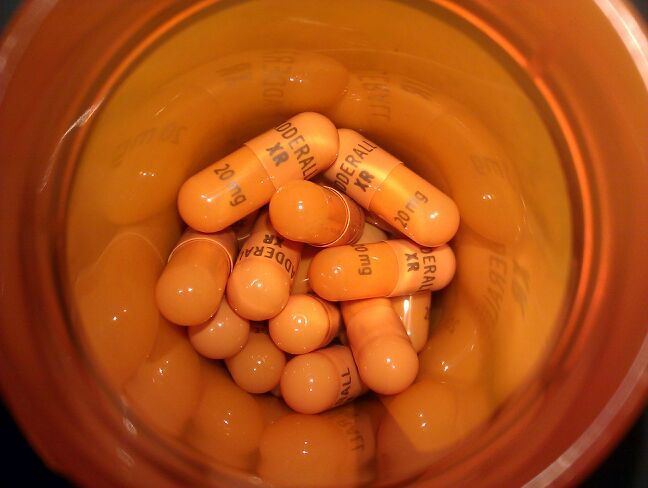Views expressed in opinion columns are the author’s own.
Ohio State University recently released a study in which 16 percent of college students admitted to misusing prescription stimulants to make it easier to study and cope with college life. It’s important to take note that these are students who admitted to doing so, and there are likely many more who did not answer honestly.
The abuse of stimulants like Adderall is all too common on college campuses, and this is not the first study to say so. What’s really insidious, though, is how Adderall and other stimulant usage has become increasingly normalized.
A cafe on the Temple University campus was recently criticized for having a neon pink sign that reads “Up All Night on Adderall,” and for staunchly refusing to take down the sign. This contributes to a larger problem: While it is, in general, not healthy to use prescription drugs that are not prescribed to you, it creates a culture of shame for students who are actually prescribed these stimulants.
While many students misuse Adderall to get a competitive advantage over other students — during tests or when studying — there are a lot of other students who need stimulants to function at the level that neurotypical individuals can without any drugs. These students may have ADHD, post-traumatic stress disorder, bipolar disorder, or a number of other mental illnesses that cause them to dissociate, space out, or make it difficult for them to focus. They have been prescribed stimulants like Adderall or Vyvanse not to give them a competitive advantage, but rather to help them study at the same level that many students can without stimulants.
When we normalize the abuse of Adderall, we negatively impact these students. They begin to feel like using their prescribed stimulants for an exam is cheating or giving them an advantage over the other students. It is absolutely not, but given the current college culture around Adderall, it feels like it is. Some students may abstain from taking their stimulants precisely because of this abuse, which romanticizes the use of Adderall when it is actually a necessary medication for many students.
Additionally, students who have been prescribed stimulants may feel like they have to hide the fact that they are taking them. The culture of stimulant abuse erases the experiences of those who actually need these medications and makes it seem like anyone who is taking Adderall is misusing it. There should be no shame in using something prescribed to you, but this culture makes students, who likely already face stigma for their disabilities, doubly ashamed to take the medication they need.
Students who misuse stimulants are using them unfairly. It may seem like a personal decision; an individual uses the stimulant and it seems like it doesn’t affect anyone else — but it does. We’ve created a culture where the misuse of Adderall is more normalized than the prescribed use.
We should also look at the effects of using Adderall when someone does not have ADHD or a related condition. While Adderall may help you to recall information or pay attention, it will not help you with more complex tasks. If you take a dose that is larger than commonly prescribed, there is a small chance it will result in abnormal heart rate, heart attack, or seizure.
Those are all short-term consequences; there have not been any studies to look at how long-term Adderall abuse impacts the body. Adderall also has a number of side effects, such as appetite loss, unhealthy weight loss, heart palpitations, and more. With the abuse of Adderall, the symptoms can worsen to include anxiety, depression, erratic behavior and paranoia.
Using stimulants like Adderall when they are not prescribed to you is illegal. However, beyond its illegality, using these drugs creates a culture where students who actually need stimulants to function internalize the notion that using them is cheating or giving them an unfair advantage.
Maybe it feels like your Adderall misuse is affecting only you as an individual, but pause for a moment and consider the culture that you are contributing to. The next time you want to reach for a stimulant or ask to borrow one from your friend who was actually diagnosed with ADHD, consider drinking a cup of coffee instead.
Liyanga de Silva is a junior English and women’s studies major. She can be reached at liyanga.a.ds@gmail.com.



